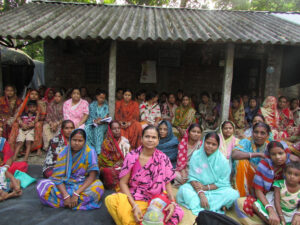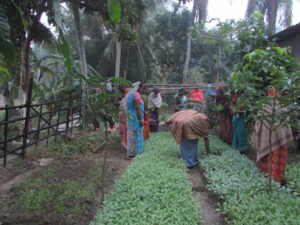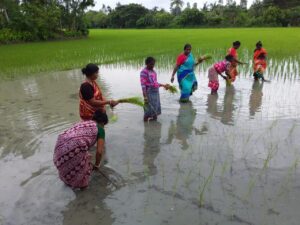
Nature-oriented farming and allied livelihood
 One of the keys to a sustainable future lies in nature-oriented livelihood practices. With this understanding and vision, we, from DISHA, have engaged in providing training to rural families in West Bengal in undertaking sustainable and eco-friendly farming and other livelihood practices—nature-oriented farming, fishing, mushroom cultivation, beekeeping, livestock rearing, etc., and encouraging entrepreneurship among the communities based on such environmentally sound practices. Given our concern for the environment and the need for conservation, we have focused on working towards providing encouragement and support to sustainable livelihood practices most suitable for the environment and for the grassroots-level communities.
One of the keys to a sustainable future lies in nature-oriented livelihood practices. With this understanding and vision, we, from DISHA, have engaged in providing training to rural families in West Bengal in undertaking sustainable and eco-friendly farming and other livelihood practices—nature-oriented farming, fishing, mushroom cultivation, beekeeping, livestock rearing, etc., and encouraging entrepreneurship among the communities based on such environmentally sound practices. Given our concern for the environment and the need for conservation, we have focused on working towards providing encouragement and support to sustainable livelihood practices most suitable for the environment and for the grassroots-level communities.
- Our support to improving and enhancing livelihood practices of communities began in the villages of Gosaba CD Block, in the South 24 Pargana Sundarban area. During 2011-15 we supported the local community by providing goats, poultry, fish seeds, digging of ponds, planting of medicinal herbs and mangroves [particularly, the Sundari (Heritiera fomes).

- In 2016, we were requested by the Government of West Bengal, through the Anandadhara or the State Rural Livelihood Mission (SRLM), to help in the formation of Community Managed Sustainable Agriculture (CMSA) training teams to train rural women SHGs in environment-oriented sustainable agricultural methods. Our efforts have led to the creation of active CMSA training teams, employed by the Government across 5 districts in South Bengal. The teams are now mostly functioning as entities funded and managed by the government. However, DISHA continues to keep track of the work of its teams in the Purba Medinipur and Bankura districts and helps and guides the personnel as and when needed.

- From 2017 to 2019 (at the end of which year the project came to an end), we had been running a community-based knowledge hub cum training centre at the Dhuchnikhali Mouza, in Sandeshkhali II Block of the Sundarbans, for providing hands-on training to people from the local communities in implementing sustainable and nature-oriented livelihood methods and practices. Our focus areas of work in this regard was facilitating environmentally and scientifically sound indigenously rooted techniques of agriculture, fishing, beekeeping, and livestock rearing, along with creating a repository of indigenous rice varieties, enabling knowledge-based empowerment of women farmers in highly saline areas, and orienting women from the local communities towards agriculture-based entrepreneurship. During those three years we had succeeded in spreading awareness, developing skills, and promoting entrepreneurship within the communities we worked with.
- We continue to support, guide, and monitor community efforts towards environment-oriented sustainable agricultural and other livelihood practices in the Sundarbans and elsewhere.
- Recently, we have established a community centre in Sudhangshupur, in Gosaba CD Block, to provide training to Tiger Widows and other local women in nature-oriented resource-conserving livelihood practices. We continue to encourage and provide hands-on facilitation and support to the local communities of the Sundarbans and elsewhere in undertaking sustainable and nature-oriented methods of farming, fishing, beekeeping, and livestock rearing. Assisting in women’s empowerment in rural areas through entrepreneurial skill-building based on nature-oriented livelihood practices has, over time, come to be one of our focus areas.




